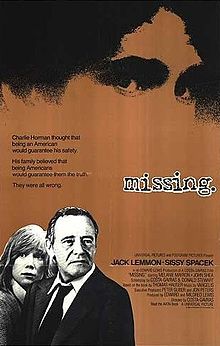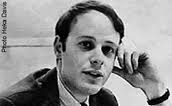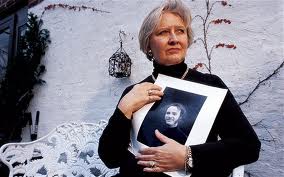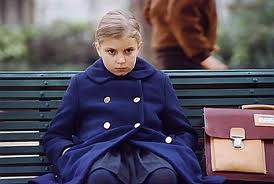 This movie depicts the pursuit for the whereabouts of the journalist Charles Horman by his wife and father after his disappearance during the chaos that followed the Chilean military coup d’état in 1973; they search for several days in the capital Santiago before arriving at the conclusion that Charles may have been executed because he knew of the secret involvement of the CIA with the coup d’état.
This movie depicts the pursuit for the whereabouts of the journalist Charles Horman by his wife and father after his disappearance during the chaos that followed the Chilean military coup d’état in 1973; they search for several days in the capital Santiago before arriving at the conclusion that Charles may have been executed because he knew of the secret involvement of the CIA with the coup d’état.
Charles Horman is a real person, and since he was born in 1942, he is the same generation as President Clinton and President Bush (the son), who were born in 1946. This generation is known as America’s baby boomers, and this generation was greatly influenced by the anti- Vietnam War movement and the hippie movement.  In this movie, Charles Horman is depicted as a strongly curious, but slightly rash author of juvenile literature, but in reality, Charles Horman was a writer who was properly trained in journalism after graduating from Harvard. This movie is based off of Thomas Hauser’s book that was published in 1978, which investigated Charles Horman’s death.
In this movie, Charles Horman is depicted as a strongly curious, but slightly rash author of juvenile literature, but in reality, Charles Horman was a writer who was properly trained in journalism after graduating from Harvard. This movie is based off of Thomas Hauser’s book that was published in 1978, which investigated Charles Horman’s death.
During the American-Soviet opposition in the global Cold War, social unrest continued for a long time in Chile, where the left-wing, Popular Front supporters continued to oppose the traditional, conservative class and the right wing of military authorities. Commander-in-Chief René Schneider was among the group of military authorities of the Chilean army that advocated for a congress system and democracy, but in 1970, Schneider was assassinated by an anti-Schneider faction among military authorities. Due to his assassination, anger toward the nation’s military authorities erupted, so swing voters voted left; thus Salvador Allende of the Popular Front was elected as president, and, for the first time in the history of Chile, a socialist administration from a free election was established.
America viewed the Socialist Party administration as a major threat, and the CIA also revealed their intention to topple the Allende administration; therefore, Western countries including America implemented an economic blockade, and assisted anti-government strikes by the anticommunist, rich class within Chile. Also, due to the abrupt farmland reform and nationalization policies of the Allende administration, inflation increased, and there was societal chaos and a shortage of goods. However, the Allende administration succeeded in achieving unity with the people by explaining that this chaos was a scheme of the opposing faction, and in the 1973 general election, the People’s Unity coalition led by Allende gained even more votes.
On September 11, 1973, Commander-in-Chief Augusto Pinochet led armed forces and the police in an attack on the President’s official residence. President Allende—with shots being fired between the coup d’état forces and the President’s guards—committed suicide after giving one final speech on the radio. This was the 1973 Chilean coup d’état. As a result of the Chilean coup d’état, the coup’s leader, Commander-in-Chief Pinochet, assumed office as President, and Chile fell back into being a military dictatorship led by President Pinochet. Afterwards, in the 16 long years under this military regime, between thousands to tens of thousands of anti-establishment citizens were imprisoned and executed.
When the 1973 coup d’état occurred, Charles Horman happened to be staying at a beautiful health resort in Viña del Mar, but there actually was a secret planning for the coup d’état happening there. It is not known whether Charles Horman approached these people or what he learned in Viña del Mar, but on September 17, he was suddenly arrested by Chilean military authorities of the coup d’état faction, and taken away to the capital Santiago’s national stadium. After the coup d’état, the stadium was temporarily used as a prison. Story has it that he was tortured and executed there. The claim of the movie is that there must have been covert approval from the CIA to execute Horman as a criminal who opposed the coup d’état, even though he was American. When Chilean authorities claimed that his body was buried in the wall of the stadium, Horman’s family demanded that his body be handed over. It is said that the actual delivery of his body to his wife in America took six months; by that time, the body had decomposed so intensely that it was impossible to judge whether it was truly him. Horman’s wife later requested a DNA test, and learned that it was not Horman’s body.
The White House supported Commander-in-Chief Pinochet as a sort of fortress to protect South America from the threat of socialism; but when the Berlin Wall fell in 1989 and the Cold War ended, America determined there was no longer a reason to support a dictatorship that suppressed human rights, and they finally changed directions and withdrew support for Commander-in-Chief Pinochet in 1990.
Charles Horman’s kidnapping and execution happened when Nixon was President. Afterwards, the White House consistently denied the CIA’s involvement in the Chilean coup d’état, but the Clinton administration investigated classified official archives; in 1999, the administration acknowledged for the first time the CIA’s involvement in the Chilean coup d’état, and publicized the document of evidence. Regarding Charles Horman’s death, government officials under the Clinton administration stated, “It is very regrettable,” and suggested there was the possibility that, even though the American embassy in Chile actually made every possible effort to protect American citizens in the chaos after the coup d’état, those frantic great efforts did not reach Horman.
 Charles Horman’s widow, Joyce Horman, sued Augusto Pinochet in a Chilean courtroom in 2001 for the murder of her husband. In the trial investigation process, it was revealed that Charles Horman was investigating the democratic system in Chile, and investigating the life of René Schneider—who was assassinated by opposing military authorities—and there was a possibility suggested of Horman being hated and murdered by those in Augusto Pinochet’s faction, who assassinated René Schneider. In 2011, the Chilean government made the judicial decision of charging Ray Davis, a retired military officer, for the murder of Charles Horman.
Charles Horman’s widow, Joyce Horman, sued Augusto Pinochet in a Chilean courtroom in 2001 for the murder of her husband. In the trial investigation process, it was revealed that Charles Horman was investigating the democratic system in Chile, and investigating the life of René Schneider—who was assassinated by opposing military authorities—and there was a possibility suggested of Horman being hated and murdered by those in Augusto Pinochet’s faction, who assassinated René Schneider. In 2011, the Chilean government made the judicial decision of charging Ray Davis, a retired military officer, for the murder of Charles Horman.

